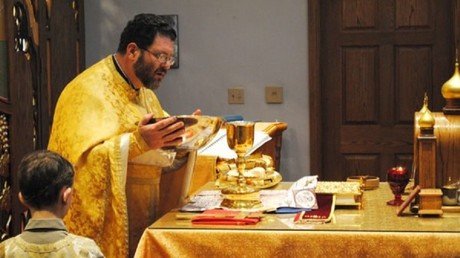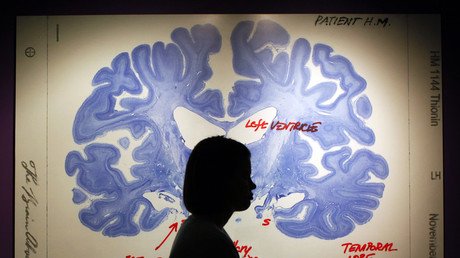'Church serfdom': Constantinople won't hand Kiev independence, new statute reveals
For all Kiev's hopes of a "fully independent" Orthodox church in Ukraine, it turns out that Constantinople has its own plans. A statute shows the new church to be in a subordinate position and not led by a patriarch.
In recent months, the Kiev government and Ukraine's priests seeking to have an internationally accepted Orthodox church not answering to Moscow, have gained the backing of the Ecumenical Patriarchate of Constantinople. It challenged the authority of the Russian Orthodox Church in Ukrainian territory by revoking its 17th century concession to the Moscow-based Patriarchy, which acknowledged its right to appoint the most senior Orthodox cleric in Kiev.
Also on rt.com Kiev’s push to split from Russian Orthodox Church will boost ‘nationalism’ & ‘chaos’ in UkraineAt the moment there are three major organizations in Ukraine calling themselves Orthodox Churches. The Ukrainian Orthodox Church is an autonomous branch of the Russian Orthodox Church and is recognized by other Orthodox churches of the world. Two others are not, and its leaders were until recently universally recognized as schismatic. Kiev's current plan is to have priests from all three churches and have them vote for the creation of a new "truly Ukrainian" church, with Constantinople recognizing it as such.
A new Constantinople-drafted statute for the future organization might in fact kill all Kiev's dreams about an independent church altogether. A part of the document adopted by the Constantinople Patriarchate's governing body, the Holy Synod, provides an insight into what the Ecumenical Patriarch Bartholomew actually has in store for Ukraine.
A ‘global conspiracy’ undermines Orthodox world – head of Russian Churchhttps://t.co/q9FNhubhXTpic.twitter.com/9mM3GAyY3h
— RT (@RT_com) 30 октября 2018 г.
So what exactly would the status of Ukraine's Orthodox Church entail in Constantinople's view?
1. No more patriarch in Kiev
One would expect that an independent church is supposed to be led by a patriarch – the highest-ranking bishop in Eastern Orthodox Christianity. Instead, the leader of the new church would still have a status of a metropolitan – just as the canonical Ukrainian Orthodox Church of the Moscow Patriarchate.
The absence of a patriarch in the church hierarchy does not technically raise an obstacle to its independence but it is still unlikely to sit well with the Ukrainian leadership.
2. No decisions without Constantinople's approval
The new statute openly states that the new Ukrainian Orthodox church would be "inextricably connected" to Constantinople, which basically means that it will find itself in a pretty much subordinate position with little prospect of ever gaining full independence.
If that was not already clear enough, the statute further elaborates that pretty much every decision the Ukrainian clerics would ever take should be coordinated with Constantinople. Otherwise, the Ukrainian hierarchs might find some of their decisions simply overturned. The document also quite explicitly says that Constantinople would only tell Ukraine's clergy what it sees fit and will not be obliged to explain any of these decisions.
3. No final say for Kiev on monasteries & saints
Some important aspects of the religious life in Ukraine will be left under the direct control of Constantinople. The new clerical structure will particularly be unable to set the status of its own monasteries or canonize anyone as a saint.
The Ecumenical Patriarch in Constantinople can also freely intervene into the elections of the Ukrainian metropolitan, should any "problems" arise, the document says. Any hierarch stripped of its clerical status in Ukraine would also be able to appeal this decision in Constantinople.
4. What can be granted can also be recalled
The statute stressed that it is Constantinople that grants the Ukrainian Church its new status. That technically means that the Ecumenical Patriarchate also reserves the right to reverse any of its decisions and deprive the Ukrainian Orthodox Church of some or all of the previously granted rights, experts and clerics in Moscow point out.
"Judging by what Constantinople in fact offers, [one can say] that it can also recall [any of its decisions] at any moment," Professor of Church History at St. Tikhon's Orthodox University Alexander Dvorkin told RT.
"Constantinople fiddles with its own decisions," Aleksandr Volkov, the deputy head of the Moscow Patriarch Kirill's press service said, adding that "it is difficult to build stable church life on such basis."
'Church serfdom, not even autonomy'
The status of the proposed church de facto is "at odds with everything" the government in Kiev and its schismatic allies wanted, Dvorkin said. "They got neither independence nor even autonomy. The [statute] provisions show that the structure Constantinople seeks to create is an absolutely dependent one."
The fact that Constantinople seeks to make Ukrainian hierarchs consult with it on almost all canonical and administrative issues shows that it does not even try to hide its goal of making the Ukrainian Orthodox Church its subordinate, the professor added.
"This would be a church serfdom," Volkov said, adding that Constantinople in fact only secures its own interests in expanding its influence and creating puppet structures.
The "unification council," a gathering of priests meant to create the new Kiev-supported church, is to be held later in December. But the event is at risk of becoming a "division council," since the canonical Ukrainian Orthodox Church has firmly refused to take part in it. But the two schismatic organizations might now also become reluctant to take part in it. They actually possess greater freedom now, when their lack of recognition is compensated by having self-rule, than they would get under Constantinople.
Ukraine's proposed new church may prove to be a "giant with the feet of clay," Volkov said, stressing that this structure has barely taken shape but is already "falling apart at the seams."
"Even if it will be created by politicians, it will still soon cease to exist," he predicted.
Think your friends would be interested? Share this story!














